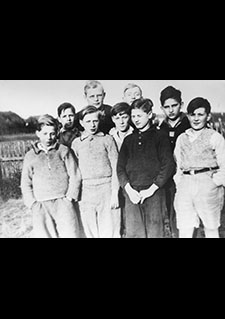Embracing Social Involvement
Since he was still too young to be ordained as a pastor following his academic rise, Bonhoeffer took advantage of a fellowship for a year abroad at Union Seminary in New York in 1930. He became familiar with the ethical dimension of Christian life there. One of the professors had students study the stock market crash of 1929 and the Great Depression from a Christian perspective.
Above all however, Bonhoeffer encountered the spirituality of the Abyssinian Baptist Church in Harlem where he regularly attended worship services. The dramatic reality of segregation affected him just as much as the African Americans’ Christian activism and their spirituals and gospel music. Years later, he still played the records he had brought back at the theological seminaries. The impression I received from today’s representatives of the social Gospel will be defining for a long time to come, he wrote.
Although Bonhoeffer continued pursuing academic theology after his ordination as an adjunct professor and worked as a student chaplain on the side, the social dimension of the Gospel attained primary importance. In 1931, he became the assistant pastor at Zion Church in Berlin and had to do with a confirmation class of students from disadvantaged social backgrounds, which had gotten completely out of control. He rented a room in the neighborhood in order to be there and gradually earned the boys’ trust. With his mother’s assistance, he made sure that every one of them eventually received a proper suit. After confirmation, he drove with part of the group to his parents’ vacation house in Friedrichsbrunn in the Harz region (photo).
In the summer of 1932, he assisted in establishing a “Youth Club for Young Unemployed People” in Charlottenburg, an utterly new social project for its day. His parents also provided the necessary space for this as well, letting him have a plot of land with a wooden hut located in this part of the city. Following the National Socialists assumption of power in January of 1933, the Communist frequenters to the Youth Club were hidden in it for a time. Bonhoeffer’s biographer Eberhard Bethge described this phase as the turning point in his life from theologian to Christian.
Source / title
- © by Gütersloher Verlagshaus, Gütersloh, in der Verlagsgruppe Random House GmbH, München

